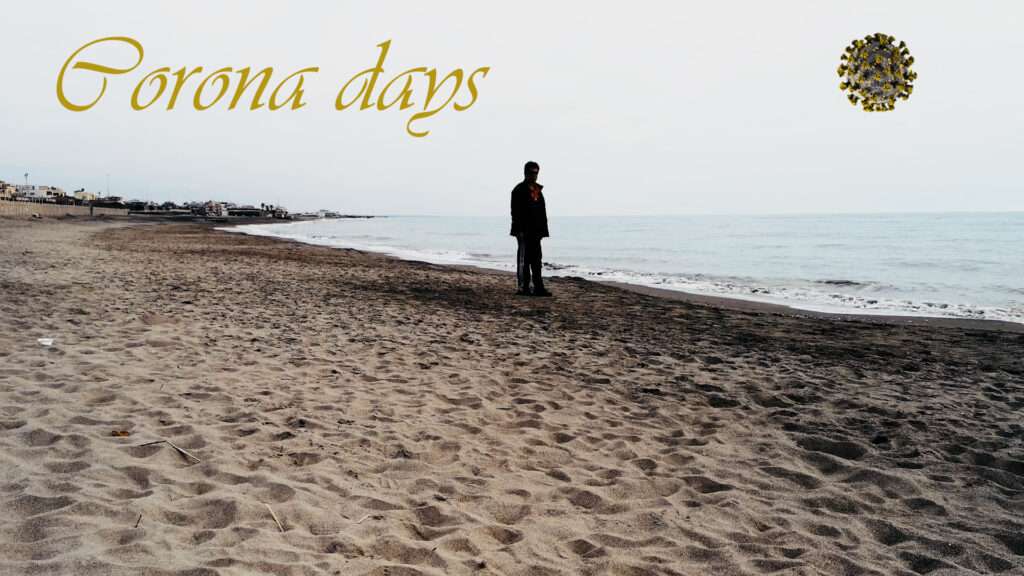Loneliness, in its negative sense, has become one of the predominant feelings in the age we live in. A widespread problem especially in the large western metropolises, to which products and services have tried to give answers and make profits. From the speed dates of the 2000s to the invention of social networks and virtual communication, man always seeks contact and confrontation with his peers in a society that is moving in the opposite direction. Understanding loneliness is one of the fundamental steps for developing one’s inner growth.
When someone is left alone, they can feel uncomfortable. He only feels good if he is in company, if he is alone he is ashamed of it. Sooner or later everyone is faced with this problem. It affects millions of people because almost all of us are educated in a certain way. Loneliness is rarely encouraged by parents, teachers, or any other social setting we attend as children. A lonely child is always considered a little strange, a child who has problems, perhaps some embryonic form of psychic disorder. These are ideas that have very distant origins and that have influenced entire generations.
The more the individual feels shunned by others, the more his anxiety grows to establish contact of any kind. At the same time, however, he begins to avoid any relationship for fear of being rejected. A self-defense mechanism to protect one’s self-esteem and to allay the nervousness that isolation causes.
Loneliness is a subjective perception

In this way everyone moves further and further away from their own being. The presence of the other keeps you in tension, anchored to reality. But if you relax alone with yourself you are going against what society has instilled in you, towards unknown territory. The lonely individual is seen as a potential danger: he can be completely himself. Nobody can give you orders, nobody can criticize you or tell you what you must or must not do. He becomes not the person people want, but something else.
Scientists have found no problems with many people who spend most of their time alone. On the contrary, there are people who live many social relationships but within them have a deep feeling of negative loneliness, of isolation. Why?
The negative feeling of isolation comes from a subjective perception of people. The quality of their relationships, the frustrations connected to them, the conflicting behaviors, the misunderstandings, make you feel alone even when you are apparently in good company. The brain worsens its activity due to anxieties and negative perceptions and sinks into a state of constant stress from which it is then difficult to get out.
Sometimes the best option is to choose to spend time with the right people. Because to remove that annoying, sometimes unbearable feeling of isolation, we cannot continually try to communicate when there is only a wall in front of us. For the message to reach its destination, the transmitter and receiver must be tuned to the same frequency.
But in most cases the problem can be solved with less effort, without even moving from where you are or changing the people we share our time with. Change can only happen within us, by changing the ideas and beliefs we have about loneliness.
Loneliness as a social conditioning

There are seven hundred centers in the brain. All your actions are decided in those centers. Some psychologists have been able to understand after lifelong work and attempts, which are the activities that each of these areas of the brain control. Negative emotions and feelings: anger, aggression, depression; or positive emotions such as love, compassion, solidarity. By inserting electrodes into specific parts of an animal’s brain they discovered that it was possible to totally control its actions.
By implanting an electrode in a bull’s brain, it was possible to control the animal’s actions and reactions from a distance, with a remote control. The bull no longer attacked the people around him. If the command that was sent to him was to remain still, he remained perfectly still. Just like a radio-controlled puppet.
That’s exactly what happened to Alex from A Clockwork Orange, by Stanley Kubrick. At the final demonstration of the cure Ludovico’s brain had been so conditioned and manipulated that he was totally unable to react with violence. He had become defenseless to any abuse against him due to an unbearable nausea that paralyzed any attempt at a violent reaction. The criminal Alex had become totally controllable without any effort, like pressing a button on a remote control.
Social conditioning of the mind works in exactly the same way. These are ideas that came to us from the outside but that don’t really belong to us. They are ideas, thoughts, beliefs that can be completely reversed.
Nobody put an electrode in your brain, but social conditioning works the same way. By freeing the mind from beliefs of what is right and what is wrong, by regaining one’s individuality, the perception of loneliness can change from negative to positive.
Loneliness as isolation

The exact term is therefore not loneliness but isolation. Loneliness often has a positive meaning: it is sought and experienced as a creative and fulfilling moment. There are millions of people who can be defined as loners, who don’t like being too much around people and prefer to cultivate their inner world.
Negative loneliness, isolation, is caused by the total lack of authenticity in relationships with others. There is no lack of encounters and relationships but we perceive them as artificial, superficial. they do not reflect us at all, and we feel misunderstood. In most cases, however, the cause is in the person who feels this feeling. He tries to defend himself, voluntarily withdraws from others to protect himself, to avoid negative thoughts and avoid stressful situations. Maybe he behaves hostile, reacts in an exaggerated and violent way, easily enters into controversy, but does not realize it. We ourselves create our loneliness, both positively and negatively.
Loneliness in the various seasons of life

But our approach to loneliness changes dramatically over the course of life. It is a rare phenomenon among children and adolescents, it is rarely frequented in youth, It begins to become frequent in adulthood and grows over the years. Our attention shifts from external to internal experiences. We become aware that external conditions and relations do not make a real change in ourselves. The external journey is never a real journey without a journey into the inner world.
From this point of view, loneliness is perhaps the most desirable state there can be. The inner world and not the outer one is the path that makes us truly grow. But at the same time, relationships and emotional relationships are fundamental for our psychological and physical balance.
Moviess to watch about loneliness
The Exterminating Angel

In The Exterminating Angel “by Luis Bunuel, negative loneliness is the inevitable consequence of belonging to the bourgeois class. It is the same rituals, the same beliefs, the same lifestyle that make the rich bourgeois feel imprisoned in the villa , despite being forced to live for days all crowded together in a hall. The protagonists of The Exterminating Angel are more alone than the mystic of Simon of the Desert, by Bunuel himself. The aspiring saint is however condemned to solitude by the rejection of temptations of the world, but it has some more chance of redemption because it is not rooted in any social “prison”. The rich bourgeois, on the other hand, have no way out. Although the gate to the street is open and no one prevents them from leaving scampi.
So here it emerges what can be the deep roots of negative loneliness, that sense of isolation from the world that reaches us at certain moments in life. It can be an external or internal cause. In the first case we should plan for a change that can often seem frightening, or perhaps impossible. It would be appropriate to say that it is time for a change of scenery, that the environment we frequent, that the people we frequent are no longer useful for our needs. A drastic change is needed which can mean looking for new points of reference, relationships that can bring us real satisfaction. Interactions, exchanges and feelings that can truly reflect the image we have of ourselves.
Corona Days

In the film Corona days, by Fabio Del Greco, the protagonist is left alone in his house, separated from his wife due to the restrictions of the lockdown. This situation causes growing feelings of fear and anguish in his mind related to his isolation. He needs to rework the relationship with others, with his father who is no longer there, with his being temporarily isolated from him as an individual from the rest of the world. In the film’s finale, however, he finds the solution to this condition of forced solitude by acquiring a new awareness of his inner world, a new perception of time and space. He finds a way to “expand himself” beyond external conditions that do not depend on his will.
A solution is therefore not to passively suffer what is imposed on us from the outside and which is the most widespread and predominant feeling, but to switch to a mode of action and change. A change that finds its strongest expression in the change in the perception we have of reality. In this film, the change of perception concerns the unhinging of what are conventional ideas about time: past, present and future add up in a larger present, where negative loneliness does not find fertile ground.
The Last Laugh

In the film The Last Laugh, director Murnau tells of the extreme loneliness of the protagonist, Jannings, an elderly man who hides from everyone that he has been downgraded by his boss: from a uniformed porter of a prestigious hotel to a guardian of bathrooms. It is an inner journey into the anguish created by the mind of man. Fears and shame caused by the values that the character has absorbed from the world in which he lives. From his family, his neighbors and the people of his neighborhood. It is a wounded ego who finds himself in a situation of profound loneliness because he has lost everything that seemed important to him. But it’s just a hallucination of him. Or rather, a hallucination built on the values and beliefs of the people around him.
In reality, in Jannings’ behavior, which takes refuge in lies and alcohol, there is a deeply wrong attitude: expecting the worst of others, the worst of criticisms. The negative response of others becomes our conviction after a series of negative experiences that have conditioned us over time. But sometimes you have to give people the benefit of the doubt: maybe that’s not what they really think, they too have been conditioned by society. But deep down inside them, maybe they don’t really think so.
There’s a Salad Between Us

In the interesting German short film by Alice Von Gwinner entitled There is a salad between us, the young director tells us in an ironic and grotesque way the loneliness and distance of a husband and wife, now very distant due to a long dining table with a salad in the center. To separate man and woman there are a series of resentments and negative experiences that create distance, effectively rendered through the metaphor of the image.
But what if they change their way of thinking? What if they transformed their negative perception, the inability to communicate, and began to feel that great space between them as an advantage, an opportunity in which to grow their relationship? Probably, if we put ourselves in a different way, the reaction of the person in front of us will be different. By discovering the best of ourselves we also discover the best of others around us.






